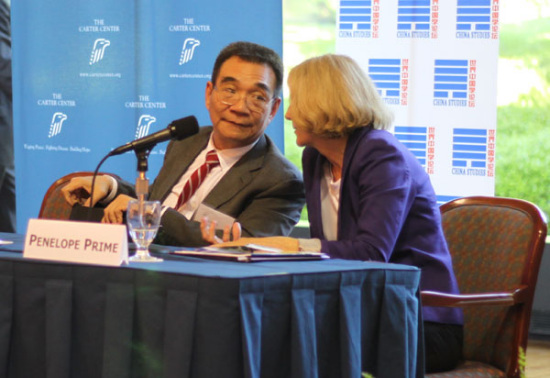
Justin Yifu Lin, director of the China Center for Economic Research at Peking University, chats with Penelope Prime, a China-focused economist at Georgia State University in Atlanta, after their co-chaired panel on Chinese economic reform as part of the World Forum on China Studies held at the Carter Center on Wednesday. Trevor Williams/For China Daily.
They may have dithered on the current level of trust between the two powers, but both U.S. and China experts agreed that Washington's resistance to the China-led Asian Infrastructure Investment Bank was a blunder that backfired on U.S. efforts to restore influence in the region.
As European allies scrambled to be charter members, the U.S. saw itself isolated when vocally discouraging them to do so, scholars said on Wednesday at the World Forum on China Studies, which was jointly hosted by the Carter Center and the Shanghai Academy of Social Sciences at the Jimmy Carter Presidential Center in Atlanta.
The U.S. raised concerns about transparency of the bank's governance structure, though some felt that this showed thinly veiled anxiety over China's rising influence in Asia, especially as the U.S. negotiates the Trans-Pacific Partnership. President Barack Obama in recent days said the sweeping trade pact with Japan and other Pacific nations could serve to keep China from "writing the rules" on regional trade in the 21st century.
Lin Yifu, former chief economist and vice-president at the World Bank, said these sentiments missed the point that the infrastructure bank is a "good deal" for a region with up to $8 trillion in infrastructure bottlenecks.
"The current sources, from the World Bank and from the Asian Development Bank, can only provide a pretty small, tiny portion for this kind of requirement. If we are really concerned with development in Asia, we should certainly welcome ... a new institution," Lin said.
For the U.S., a way to change the system would have been to reform it from within. "If you want to improve the management, the best way is to join the board," Lin said.
The infrastructure bank is just one in a series of deft moves by China - along with the BRICS bank and the "One Belt, One Road"initiative - to work within the current U.S.-led "world order" even while challenging it, said David Bachman, Henry M. Jackson professor of International Studies at the University of Washington.
"One could easily argue that with these institutional proposals and developments, China is acting as a sustainable stakeholder of the system while showing up some of the weaknesses of both the order and the United States," Bachman said.
US efforts to pass the TPP and force China to "take it or leave it" in order to participate reflect increasing worries on the US side that a global economic system that has provided it with special privileges could eventually unravel. Instead, the US should recognize that a "bipolar" world has emerged, Bachman said.
David Lampton, director of China studies and professor at the School of Advanced International Studies at Johns Hopkins University, agreed that China and the US must understand the implications of this power shift for how they relate to each other and to the world.
He called for the US to welcome enhanced Chinese participation in multilateral bodies like the International Monetary Fund, recommending that the two sides build bilateral institutions that "systematically reinforce" their interdependence and prioritize balance and stability in the global system, resisting the temptation to resort to nationalism.
"Fundamentally, America has to rethink its objective of primacy, and China must recalibrate its own sense of strength and what that strength entitles it to," Lampton said.
He encouraged joint infrastructure investment as a way to reinforce interdependence and build constructive cooperation in other countries.
"The United States and China should cooperate in the development of infrastructure projects around the world. The initial U.S. reaction to the AIIB was the wrong reaction," he said. "Washington, Beijing and perhaps NGOs in both countries could cooperate on projects in Afghanistan, for instance."
He also called for speedy negotiations on a bilateral investment treaty under consideration and for both sides to welcome mutual investment in job-creating industries. The benefits of the relationship would then become clearer to the policy makers who so often question the relationship.
"Neither the world nor our two countries can afford the United States and China as adversaries," Lampton said.
Most of the forum seemed focused on how to reduce mistrust and elevate constructive dialogue over the raft of issues China faces in reforming its economy and society.
Speeches included a morning keynote from Li Zhaoxing, former Chinese foreign minister and ambassador to the United States, who encouraged the two sides to amplify their commonalities and de-emphasize differences to maintain peace.
Other experts, including Huang Renwei, vice-president off the Shanghai Academy of Social Sciences, and Douglas Paal, vice-president of studies at the Carnegie Endowment for International Peace, addressed issues such as China's political and economic reforms.
















































